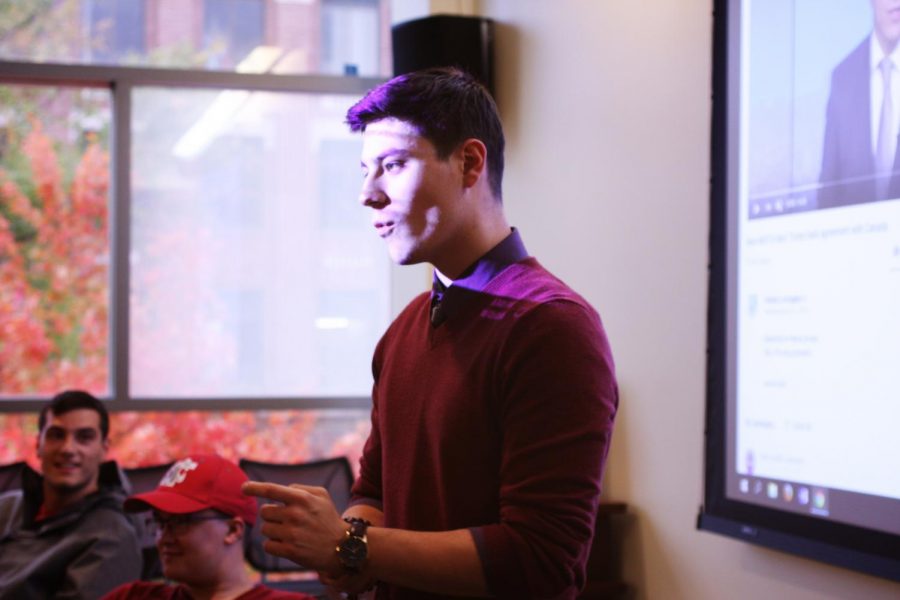Capitalism has unfair reputation
Too many people are biased toward free-market, what it has done to further U.S. global influence, economy
JACQUI THOMASSON | THE DAILY EVERGREEN
Nicolas Argon, president of the Young Americans for Liberty club, speaks at a meeting about the discrepancy between socialism and capitalism on Oct. 2 in the CUB. “You get to keep the fruits of your labor,” he said.
October 9, 2018
Wealth distribution is one of the most divisive topics in our country. It seems as if socialism and capitalism are always the center of political debate. In a more progressive era of the U.S., free-market capitalism has been given an unfair reputation, especially among youth.
Fifty-one percent of Americans between ages 18 and 29 do not support capitalism, according to 2016 data from the Institute of Politics at Harvard University poll.
It’s a common belief that with the exception of the Great Depression, young adults are more left-leaning than ever. This is most prominent in economic views. Capitalism is being painted as corrupt and greedy at its core.
I hope by the age of 18, most people have come to the realization that anything the government gives you, was taken from somebody else. Capitalism, on the other hand, can only happen voluntarily.
By keeping customers happy, it encourages businesses to lower prices and boost quality and service. With a strong presence of entrepreneurship, the economy grows and helps improve the quality of life for everyone.
So what’s causing young Americans to have such a negative view of capitalism?
River Maketa, vice-president of the Young Americans for Liberty club, had a strong opinion on the subject.
“I would say the reason it’s mostly college students who are against capitalism, is that most of us haven’t gotten into a major risk-taking world,” Maketa said. “It’s pretty easy to stay in the mindset that you’re supposed to be taken care of.”
In a country where we can find colleges that provide us with dorms, meal plans, recreation facilities and countless other amenities, it’s a solid point. I’m not trying to “imply” that we’re an entitled generation standing on a foundation of American privilege, that’s exactly what I’m saying.
Arguments for a more government-involved economy are often argued on a moral level. We can all agree that helping our fellow man is decent and humane, but can we claim these virtues are ours when they have been forced upon us? Forced virtues are a contradiction.
“You get to keep the fruits of your labor,” YAL President Nicolas Argon said. “The whole system is based on the voluntary transaction. Everything is consensual. You don’t have an authority over you who doesn’t have your interests in mind. You’re able to do what you want with your money.”
Reaping the rewards from your hard work is a natural human right, and deciding what you want to do with those rewards is your prerogative. That doesn’t sound evil to me.
This can be a very heated topic, and most people will continue to hold their current economic views after reading this. You’re entitled to your opinion, but America’s free-market capitalism is responsible for our title as the world’s largest economy.
It’s also the reason why we’re one of the most generous nations in terms of voluntary charity. It’s a basic economic principle that promoting the private sector, not a controlling government, brings economic growth. Ironically, no other system has also created a large number of people that oppose capitalism.
So next time you want to buy a hat that says “capitalism sucks” or a Che Guevara T-shirt, just steal it. Own your beliefs because having a business consensually sell you a product that’s encouraging a hatred of voluntary transaction is a pretty decent example of irony.
If you think it’s only right and necessary to distribute wealth via force, walk the walk.
Editor’s note: Kendrick Richardson is currently in the process of becoming a member of the Young Americans for Liberty club.








